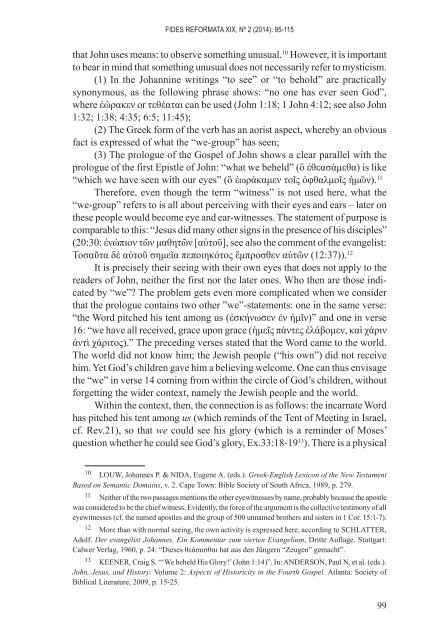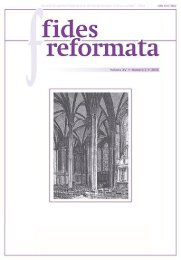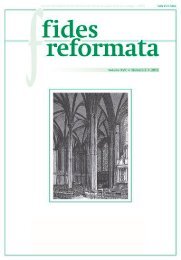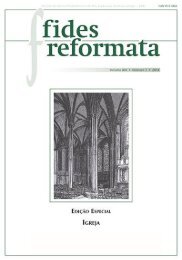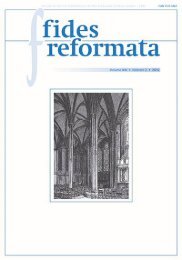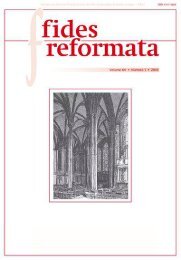Create successful ePaper yourself
Turn your PDF publications into a flip-book with our unique Google optimized e-Paper software.
FIDES REFORMATA XIX, Nº 2 (2014): 95-115<br />
that John uses means: to observe something unusual. 10 However, it is important<br />
to bear in mind that something unusual <strong>do</strong>es not necessarily refer to mysticism.<br />
(1) In the Johannine writings “to see” or “to behold” are practically<br />
synonymous, as the following phrase shows: “no one has ever seen God”,<br />
where ἑώρακεν or τεθέαται can be used (John 1:18; 1 John 4:12; see also John<br />
1:32; 1:38; 4:35; 6:5; 11:45);<br />
(2) The Greek form of the verb has an aorist aspect, whereby an obvious<br />
fact is expressed of what the “we-group” has seen;<br />
(3) The prologue of the Gospel of John shows a clear parallel with the<br />
prologue of the first Epistle of John: “what we beheld” (ὃ ἐθεασάμεθα) is like<br />
“which we have seen with our eyes” (ὃ ἑωράκαμεν τοῖς ὀφθαλμοῖς ἡμῶν). 11<br />
Therefore, even though the term “witness” is not used here, what the<br />
“we-group” refers to is all about perceiving with their eyes and ears – later on<br />
these people would become eye and ear-witnesses. The statement of purpose is<br />
comparable to this: “Jesus did many other signs in the presence of his disciples”<br />
(20:30: ἐνώπιον τῶν μαθητῶν [αὐτοῦ], see also the comment of the evangelist:<br />
Τοσαῦτα δὲ αὐτοῦ σημεῖα πεποιηκότος ἔμπροσθεν αὐτῶν (12:37)). 12<br />
It is precisely their seeing with their own eyes that <strong>do</strong>es not apply to the<br />
readers of John, neither the first nor the later ones. Who then are those indicated<br />
by “we”? The problem gets even more complicated when we consider<br />
that the prologue contains two other ”we”-statements: one in the same verse:<br />
“the Word pitched his tent among us (ἐσκήνωσεν ἐν ἡμῖν)” and one in verse<br />
16: “we have all received, grace upon grace (ἡμεῖς πάντες ἐλάβομεν, καὶ χάριν<br />
ἀντὶ χάριτος).” The preceding verses stated that the Word came to the world.<br />
The world did not know him; the Jewish people (“his own”) did not receive<br />
him. Yet God’s children gave him a believing welcome. One can thus envisage<br />
the “we” in verse 14 coming from within the circle of God’s children, without<br />
forgetting the wider context, namely the Jewish people and the world.<br />
Within the context, then, the connection is as follows: the incarnate Word<br />
has pitched his tent among us (which reminds of the Tent of Meeting in Israel,<br />
cf. Rev.21), so that we could see his glory (which is a reminder of Moses’<br />
question whether he could see God’s glory, Ex.33:18-<strong>19</strong> 13 ). There is a physical<br />
10 LOUW, Johannes P. & NIDA, Eugene A. (eds.). Greek-English Lexicon of the New Testament<br />
Based on Semantic Domains, v. 2. Cape Town: Bible Society of South Africa, <strong>19</strong>89, p. 279.<br />
11 Neither of the two passages mentions the other eyewitnesses by name, probably because the apostle<br />
was considered to be the chief witness. Evidently, the force of the argument is the collective testimony of all<br />
eyewitnesses (cf. the named apostles and the group of 500 unnamed brothers and sisters in 1 Cor. 15:1-7).<br />
12 More than with normal seeing, the own activity is expressed here, according to SCHLATTER,<br />
A<strong>do</strong>lf. Der evangelist Johannes. Ein Kommentar zum vierten Evangelium, Dritte Auflage. Stuttgart:<br />
Calwer Verlag, <strong>19</strong>60, p. 24: “Dieses θεάσασθαι hat aus den Jüngern “Zeugen” gemacht”.<br />
13 KEENER, Craig S. “‘We beheld His Glory!’ (John 1:14)”. In: ANDERSON, Paul N. et al. (eds.).<br />
John, Jesus, and History. Volume 2: Aspects of Historicity in the Fourth Gospel. Atlanta: Society of<br />
Biblical Literature, 2009, p. 15-25.<br />
99


